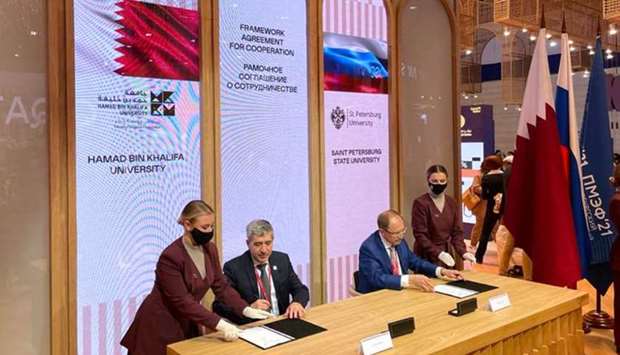Hamad Bin Khalifa University (HBKU) has expanded its co-operation with Russian academic institutions and other entities during the 24th St. Petersburg International Economic Forum (SPIEF). HBKU’s colleges and research institutes signed several agreements to promote closer working relationships in areas of research and education.
HBKU, a Qatar Foundation member, formalised a framework agreement for co-operation with Saint-Petersburg State University, one of the oldest Russian universities to facilitate joint academic and scientific exchange and activities such as courses, conferences, seminars, symposia, or lectures, and student exchange. The agreement will lead to collaborative research projects and publications.
HBKU additionally signed a three-year Memorandum of Understanding with the National Research University Higher School of Economics, Russia, to enable cooperative programmes in teaching and research between their respective faculty members, departments, institutes, and research centers. Joint research, publications and library exchanges, faculty lectures and talks, and participation in scholarly events, as well as the exchange of faculty and students for study, teaching, and research, are potential activities under the MoU.
The university signed a five-year cooperation agreement with Financial University under the Government of the Russian Federation. The two institutions will explore academic exchange and double degree programmes in areas of mutual interests and support the cultural and academic exchange of students. The agreement provides for reciprocal visits by teaching staff for professional development and the exchange of research experience and will facilitate joint research among other forms of direct cooperation between their programmes.
Dr Ahmad M Hasnah, president of HBKU, said, “We welcome the opportunity to take part at SPIEF and highlight how HBKU's innovation-driven research is serving Qatar in building a competitive knowledge-based economy. In the interest of contributing joint solutions to current global challenges, we are happy to be a part of international dialogue that examines the changing dynamics between human capital, culture, and technologies and how it can drive sustainable international economic development.”
HBKU additionally signed a three-year Memorandum of Understanding with the National Research University Higher School of Economics, Russia, to enable cooperative programmes in teaching and research between their respective faculty members, departments, institutes, and research centers. Joint research, publications and library exchanges, faculty lectures and talks, and participation in scholarly events, as well as the exchange of faculty and students for study, teaching, and research, are potential activities under the MoU.
The university signed a five-year cooperation agreement with Financial University under the Government of the Russian Federation. The two institutions will explore academic exchange and double degree programmes in areas of mutual interests and support the cultural and academic exchange of students. The agreement provides for reciprocal visits by teaching staff for professional development and the exchange of research experience and will facilitate joint research among other forms of direct cooperation between their programmes.
Dr Ahmad M Hasnah, president of HBKU, said, “We welcome the opportunity to take part at SPIEF and highlight how HBKU's innovation-driven research is serving Qatar in building a competitive knowledge-based economy. In the interest of contributing joint solutions to current global challenges, we are happy to be a part of international dialogue that examines the changing dynamics between human capital, culture, and technologies and how it can drive sustainable international economic development.”

